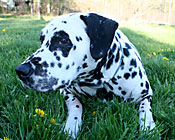This is a rather long reply to Susan Harris’s post over at Garden Rant this morning.
First Susan, no one has ever accused me of being a ‘horticultural expert’. I’m a gardener and communications guy who has the good fortune of working with some great plant people at my day job. When I blog, I’m just an avid gardener like the rest of you, so I won’t presume to speak for my co-worker “Frank S. Rossi, a turf specialist at Cornell University and a nationally recognized expert on golf course maintenance, [who] does not share [SafeLawn’s founder] Mr. Tukey’s enthusiasm,†as Leslie Land writes in the NY Times. (You can read the full article until it disappears behind the NY Times for-pay firewall.)
I think that Frank does share Paul’s enthusiasm for helping lawnowners make sure their lawns are environmental assets, not liabilities, and making sure that they’re not using products that they don’t need. Frank is the author of Lawn Care Without Pesticides, which is available online.
I share that enthusiasm, too. I’m not a lawn freak. But Fred the Dalmatian loves the lawn, and Jade (the lab-border collie mix up in my banner pic) loves to roll in the grass. I would never apply anything to my lawn that would hurt them. But my lawn doesn’t qualify as organic, because most falls I apply about a pound of nitrogen (as urea) to part of my lawn, focusing on the weak spots. (More about that toward the end.)
Where Frank and Paul part ways, I think, is on the efficacy of compost teas. The Times’ article says “Dr. Rossi’s research lab has evaluated compost tea’s effect on turf and found little proof of a major benefit.†I think that’s accurate reporting.
My understanding of compost teas is that they are supposed to act as ‘microbial inoculants’ to kind of jump start soil biological processes. I believe those processes are important. But for teas to show benefits, first you have to have soil where the processes are out of whack. If your soil is healthy, I’m not sure why you’d expect a lot of benefit.
You throw in all the other variables – the origin of the compost needed to make the tea, what microbes are present in that compost, how the tea is ‘brewed’, the type of soil it’s applied to, the time of the year, etc. etc. – and I think that it’s very difficult to make the blanket statement that compost tea works. Paul is quoted as saying that “ … it’s like a blood transfusion for the lawn.†It’s a nice analogy, but not all health issues are solved by a blood transfusion.
I personally have a concern about organic fertilizers from a phosphate pollution perspective. If you soil test most mature sods, the phosphorus levels are often high (or at least sufficient) – particularly if they’ve been fertilized during establishment. (This may not be true for all soils, particularly sandy ones. Take a soil test if you aren’t sure.).
While there’s no doubt in my mind that the organic matter in most organic fertilizers and composts benefit grass in most cases, especially on disturbed soils and soils low in organic matter, most of those fertilizers are also high in phosphorus. That phosphorus has the potential to run off and pollute surface waters. (Some of us are old enough to remember the days when detergent manufacturers removed phosphates from their products because they were killing aquatic ecosystems.)
Grass needs nitrogen to grow. In healthy, mature sods, you may get enough just by leaving the clippings to recycle N. Or you could plant clover to fix nitrogen for your lawn. But if you plan to apply organic fertilizers that are high in phosphorus on a regular basis to feed nitrogen to the grass, you are going to risk phosphate runoff.
For those of you in the Chesapeake Bay watershed (or any other watershed with a lot of animal agriculture), livestock farmers face a similar problem. If they apply enough manure to meet the nitrogen needs of their corn, they overapply phosphorus. Over the years, soil test P levels go up, and any soil that erodes carries that phosphorus into the bay.
When friends and neighbors ask me about lawn care, I really don’t focus in on what to apply when. I think you get a much larger bang for your effort by concentrating on mowing management and some other lawn basics:
- Mow high – Set your push mower at the highest setting or your riding mower so that you are cutting the grass at 3 or 4 inches.
- Leave the clippings – To recycle nutrients.
- Keep your mower blade sharp – So you don’t stress the grass.
- Don’t grow grass – Where it doesn’t want to grow. Hardscape high-traffic areas. Plant shade-loving plants where there isn’t enough light. Plant a rain garden in poorly drained areas.
Like gardening and politics, all lawn care is local. I write from a Northeast perspective. Your mileage may vary, particularly if you are in a different neck of the woods.


